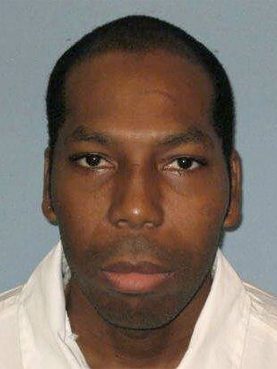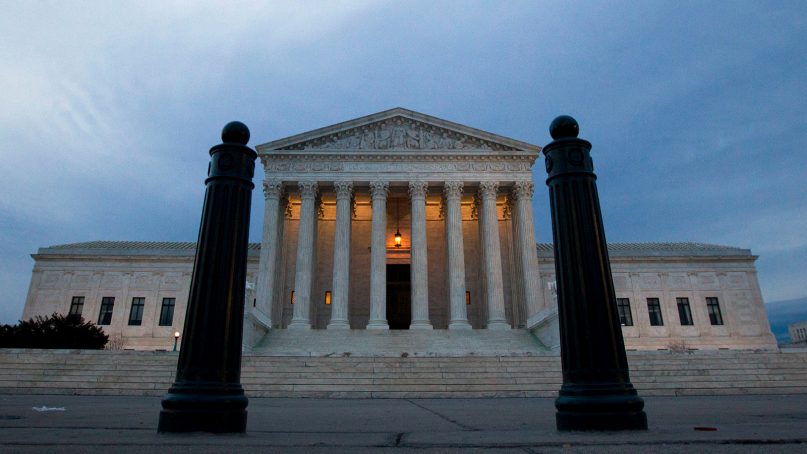(RNS) — Last Thursday (Feb. 7), the U.S. Supreme Court dismissed a federal appeals court’s stay of execution granted to Domineque Ray, a death row prisoner in Alabama, denying Ray the right to die in the presence of his imam because the imam wasn’t officially sanctioned to be in the execution room. Clergy who attend state executions in Alabama must be employed by its Department of Corrections, a regulation unique to the state.
Alabama only employs Christian ministers in its prisons.
A plain text reading of the First Amendment suggests that Alabama’s restriction violates the Establishment Clause, which insists Congress “make no law respecting an establishment of religion.” Or, as Justice Elena Kagan noted in her dissent to the Ray opinion, “the clearest command of the Establishment Clause is that one religious denomination cannot be officially preferred over another.”
Kagan called the court’s refusal to uphold the stay “profoundly wrong” because it disregards Alabama’s “denominational preference” for Christianity. The majority opinion didn’t take up this probable violation of the Establishment Clause, citing only the “last-minute nature” of Ray’s request. That is, America’s highest court prioritized the state of Alabama’s “preferred execution date” over an American citizen’s First Amendment rights.

This undated file photo from the Alabama Department of Corrections shows inmate Domineque Ray. (Alabama Department of Corrections via AP)
The events leading up to Ray’s execution betray an indifference, if not an outright hostility, to the Muslim inmate’s right to final religious accommodations. The state specified that Ray had been given a Quran and, “incidentally,” was allowed a prayer mat in his holding cell. But according to Kagan, “the prison refused to give Ray a copy of its own practices and procedures,” so Ray was not told until Jan. 23 that his imam could not be in the chamber with him. (Thus the “last-minute nature” of his complaint.) Having his imam by his side, instead of looking on from a viewing room, allegedly constituted a security risk.
The American legal system’s problem with Muslims is not, of course, unique to Alabama’s Department of Corrections. Muslims comprise roughly 1 percent of the U.S. population, but estimates by prison chaplains suggest Muslims make up about 9 percent of incarcerated people. Chaplains surveyed by the Pew Research Center also say Muslims are currently the most underserved religious group in American prisons. Only 7 percent of American chaplains are Muslim.
But the American legal system’s problem with religion is bigger than Muslims or Islam. The American government has a Christianity problem. Even would-be protectors of religious freedom for all traditions tend to interpret the law in Christian terms. And while Obergefell v. Hodges (2015), which legalized same-sex marriage at the federal level, did favor mainstream and progressive Christian positions, the broader trend has been for the court to privilege conservative Christianity.
The Masterpiece Cakeshop decision last year, which found for a baker who refused to serve a queer couple, builds on a precedent set by Burwell v. Hobby Lobby (2014), which granted conservative Christian corporations protections for their sincerely held if scientifically incorrect beliefs about contraception. The Hosanna-Tabor case in 2012 exempted religious organizations from federal discrimination laws after a teacher dismissed from a Lutheran school sued under the Americans with Disabilities Act.
Religious conservatives, liberals and progressives united briefly to criticize the Supreme Court’s decision in Employment v. Smith (1990), a decision denying unemployment benefits to members of the Native American Church fired for ingesting peyote as a religion practice. But most recent high-level religious freedom cases have been directed toward shoring up the interests of conservative Christians.
After last week’s decision, an analyst for The Washington Post suggested that denying Ray the clergyperson of his choice overstepped what even conservative Christian religious freedom advocates might countenance. After all, the Post wrote, “Many religious conservatives backed Trump because he promised to fill courts with conservative judges who support religious freedom.” But most American religious conservatives have proved more than content with religious freedom decisions and legislation that privilege Christianity at the expense of Muslims and other minority religions.
The American government’s problem with Muslims, of course, isn’t unique to the prison industrial complex or the Supreme Court. Secretary of State Mike Pompeo and National Security Adviser John Bolton have long and egregious track records of anti-Muslim hostility, with ties to groups that call Islam an inherently violent religion and accuse Muslims of trying to overthrow the rule of American law.
American lawmakers, meanwhile, have insisted that Islam isn’t a religion at all, in attempts to deny Muslim claims to protections of religious freedom. This administration bombed Afghanistan more in 2018 than it has been bombed since the United States’ 2001 invasion. Even in an unprecedentedly diverse Congress, the speaker of the House does not know the difference between a hijab and a hat.
In short, there’s little evidence that the American government, even in the year of some people’s Lord 2019, would balk at disenfranchising Muslims — and even less evidence that conservative advocates of religious freedom will offer meaningful opposition to that disenfranchisement.
The current administration has laid plain its hostility toward Muslims and Islam. The last two years have seen three attempts to limit Muslim immigration through executive orders — despite no Muslim immigrants from the banned countries having perpetrated terrorist attacks on U.S. soil — which finally succeeded with Trump v. Hawaii, a decision Justice Sonia Sotomayor hammered for its “discriminatory taint.” Just in the last 24 hours, a president who once told CNN’s Anderson Cooper that he thinks “Islam hates us” has called for the resignation of one of only two Muslim women to ever serve in Congress.
None of this has kept Muslims from fighting for their religious freedom. Muslim Advocates and their partners are challenging the travel ban on the grounds of religious freedom in Maryland District Court this week, demanding that the courts settle the question of whether the ban violates the Establishment Clause. American Muslims aren’t done insisting their government protect and defend their religious freedom – demanding that the government of the United States actually become one, in George Washington’s words, that “to bigotry gives no sanction, to persecution no assistance.”
(Megan Goodwin is the program director for Sacred Writes: Public Scholarship on Religion, a Luce-funded project hosted by Northeastern University, and a visiting lecturer with Northeastern’s department of philosophy and religion. The views expressed in this commentary do not necessarily represent those of Religion News Service.)





